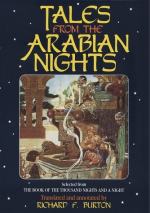[FN#174] A royal pavilion; according to Shakespear (Hind. Dict. sub voce) it is a corruption of the Pers. “Sayaban."=canopy.
[FN#175] Arab. “Musajja’"=rhymed prose: for the Saj’a, see vol. i. 116, and Terminal Essay, vol. x. p. 220. So Chaucer:—
In rhyme or elles in cadence.
[FN#176] Arab. “Huwa inna na’rifu-h” lit.=He, verily we wot him not: the juxtaposition of the two first pronouns is intended to suggest “I am he.”
[FN#177] In Moslem tales decency compels the maiden, however much she may be in love, to show extreme unwillingness in parting with her maidenhead especially by marriage; and this farce is enacted in real life (see vol. viii. 40). The French tell the indecent truth,
Desir de fille est un
feu qui devore:
Desir de femme est plus
fort encore.
[FN#178] The Arab. form (our old “bashaw”) of the Turk. “Pasha,” which the French and many English write Pacha, thus confusing the vulgar who called Ibrahim Pacha “Abraham Parker.” The origin of the word is much debated and the most fanciful derivations have been proposed. Some have taken it from the Sansk. “Paksha"=a wing: Fuerst from Pers. Paigah=rank, dignity; Von Hammer (History) from Pai-Shah=foot of the king; many from “Padishah"=the Sovran, and Mr. E. T. W. Gibb suspects a connection with the Turk. “Bash"=a head. He writes to me that the oldest forms are “Bashah” and “Bashah”; and takes the following quotation from Colonel Jevad Bey, author of an excellent work on the Janissaries published a few years ago. “As it was the custom of the (ancient) Turks to call the eldest son ‘Pasha,’ the same style was given to his son Ala al-Din (Aladdin) by Osman Ghazi, the founder of the Empire; and he kept this heir at home and beside him, whilst he employed the cadet Orkhan Bey as his commander-in-chief. When Orkhan Ghazi ascended the throne he conferred the title of Pasha upon his son Sulayman. Presently reigned Murad (Amurath), who spying signs of disaffection in his first-born Sawuji Bey about the middle of his reign created Kara Khalil (his Kazi-Askar or High Chancellor) Wazir with the title Kazyr al-Din Pasha; thus making him, as it were, an adopted son. After this the word passed into the category of official titles and came to be conferred upon those who received high office.” Colonel Jevad Bey then quotes in support of his opinion the “History of Munajjim Pasha” and the “Fatayah al-Waku’at"=Victories of Events. I may note that the old title has been sadly prostituted in Egypt as well as in Turkey: in 1851 Pashas could be numbered on a man’s fingers; now they are innumerable and of no account.
[FN#179] Arab. “’Ala babi ’llah"=for the love of the Lord, gratis, etc., a most popular phrase.
[FN#180] Arab. “Bahar,” often used for hot spices generally.
[FN#181] In the text Shajarat Rih.
[FN#182] Arab. “Ma’adin"=minerals, here mentioned for the first time.




